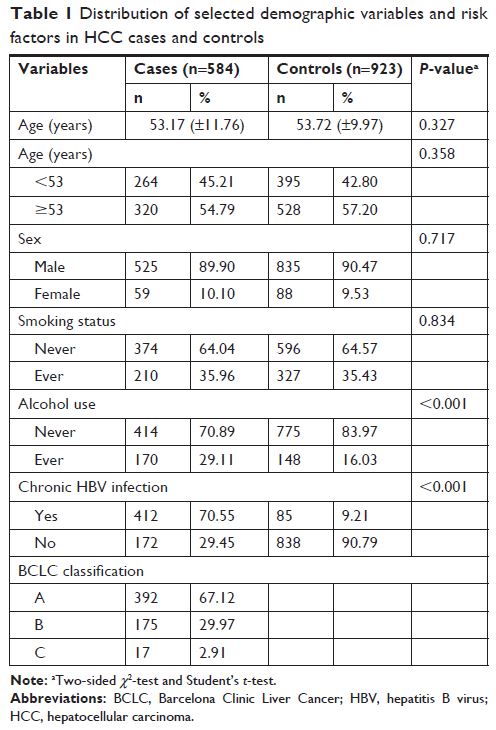9 0 6 7 6
论文已发表
注册即可获取德孚的最新动态
IF 收录期刊
- 2.6 Breast Cancer (Dove Med Press)
- 3.9 Clin Epidemiol
- 3.3 Cancer Manag Res
- 3.9 Infect Drug Resist
- 3.6 Clin Interv Aging
- 4.8 Drug Des Dev Ther
- 2.8 Int J Chronic Obstr
- 8.0 Int J Nanomed
- 2.3 Int J Women's Health
- 3.2 Neuropsych Dis Treat
- 4.0 OncoTargets Ther
- 2.2 Patient Prefer Adher
- 2.8 Ther Clin Risk Manag
- 2.7 J Pain Res
- 3.3 Diabet Metab Synd Ob
- 4.3 Psychol Res Behav Ma
- 3.4 Nat Sci Sleep
- 1.9 Pharmgenomics Pers Med
- 3.5 Risk Manag Healthc Policy
- 4.5 J Inflamm Res
- 2.3 Int J Gen Med
- 4.1 J Hepatocell Carcinoma
- 3.2 J Asthma Allergy
- 2.3 Clin Cosmet Investig Dermatol
- 3.3 J Multidiscip Healthc

LEP 和 LEPR 多态性与肝细胞癌风险的关系研究:华东汉族人群病例对照研究
Authors Zhang S, Jiang J, Chen Z, Wang Y, Tang W, Liu C, Liu L, Chen Y
Received 12 October 2017
Accepted for publication 16 February 2018
Published 11 April 2018 Volume 2018:11 Pages 2083—2089
DOI https://doi.org/10.2147/OTT.S153931
Checked for plagiarism Yes
Review by Single-blind
Peer reviewers approved by Dr Justinn Cochran
Peer reviewer comments 3
Editor who approved publication: Dr Samir Farghaly
Background: Leptin (LEP ) and LEP
receptor (LEPR ) polymorphisms may be
associated with the development of cancer.
Methods: In this study, we selected five functional LEP and LEPR single-nucleotide
polymorphisms (SNPs) and conducted a case–control study to determine the
relationship of LEP and LEPR polymorphisms with
hepatocellular carcinoma (HCC) risk in Eastern Chinese Han population. There
were 584 HCC cases and 923 cancer-free controls included in our study. HCC
patients and controls were fully matched by age and sex. SNPscan™ genotyping
method was used to analyze the genotyping of LEP rs2167270
G>A, rs7799039 A>G, LEPR rs6588147
G>A, rs1137100 G>A, and rs1137101 G>A SNPs.
Results: We found that LEP rs7799039
A>G and rs2167270 G>A polymorphisms were associated with the
susceptibility of HCC in this population (LEP rs7799039
A>G: GG vs AA: adjusted odds ratio [OR]=2.03, 95% CI, 1.22–3.38, P =0.006 and GG vs AA/AG: adjusted
OR=1.97, 95% CI, 1.20–3.22, P =0.007; rs2167270
G.A: AA vs GG: adjusted OR=2.03, 95% CI, 1.10–3.75, P =0.024 and AA vs GG/GA: adjusted
OR=2.01, 95% CI, 1.10–3.68, P =0.023).
However, LEPR rs6588147 G>A
polymorphism decreased the risk of HCC (GA vs GG: adjusted OR=0.62, 95% CI,
0.45–0.86, P =0.005 and AA/GA vs GG: adjusted
OR=0.64, 95% CI, 0.47–0.88, P =0.007).
Conclusion: This case–control study highlights that LEP rs7799039 A>G and
rs2167270 G>A polymorphisms increase the susceptibility to HCC;
however, LEPR rs6588147 G>A
polymorphism may be a protective factor for HCC in Eastern Chinese Han
population.
Keywords: LEP, LEPR, polymorphism, hepatocellular carcinoma, risk, single
nucleotide polymorphism, hepatitis B virus
